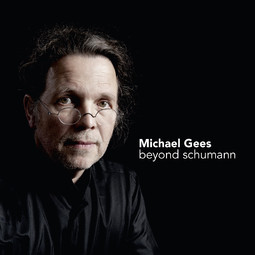 Improvisaties komen nauwelijks voor binnen het klassieke repertoire; hier en daar een slot cadens die door de solist zelf mag worden ingevuld, daargelaten. De Duits klassieke pianist Michael Gees lardeert het werk van Robert Schumann met improvisaties op zijn cd ‘Beyond Schumann‘. Hiermee kruipt hij als het ware ‘achter het werk‘ van deze vroeg 19de-eeuwse componist.
Improvisaties komen nauwelijks voor binnen het klassieke repertoire; hier en daar een slot cadens die door de solist zelf mag worden ingevuld, daargelaten. De Duits klassieke pianist Michael Gees lardeert het werk van Robert Schumann met improvisaties op zijn cd ‘Beyond Schumann‘. Hiermee kruipt hij als het ware ‘achter het werk‘ van deze vroeg 19de-eeuwse componist.
English version below
Robert Schumann (1810-1856) wordt geboren in Zwickau, in de buurt van Dresden. Hij was een begaafd pianist die les kreeg van Friedrich Wieck, met wiens dochter Clara hij later trouwde. Door zijn zucht naar virtuositeit, bedacht hij zelf een mechaniek om zijn vingervlugheid te verhogen, met als gevolg dat zijn middelvinger verlamde. Mede hierdoor werd Schumann componist en schreef o.a. veel pianowerken die door zijn vrouw Clara werden uitgevoerd: ook in Nederland. Op de dubbel-cd ‘Beyond Schumann’ staan solo pianowerken: ‘Sinfonische Etüden op. 13’ uit 1837 en de ‘Kinderszenen op. 15’. Deze laatste verwijzen naar Schumann’s jeugd waar hij in twaalf korte composities zijn kinderjaren prachtig muzikaal vertaald: het krijgertje spelen in ‘Hasche-Mann‘, een kindertekening horen we in ‘Bittendes Kind‘ of het slaapliedje ‘Kind im Einschlummern‘. Uit 1838 komt de compositie ‘Kreisleriana’ op. 16′ bestaande uit acht totaal verschillende delen: opgedragen aan tijdgenoot Frederic Chopin en gebaseerd op E.T.A. Hoffmans vertellingen. Aan het slot van de cd horen we het zevende deel uit ‘Waldszenen op. 82‘.
De pianist Michael Gees (1953) is een muzikaal wonderkind. Speelt vanaf zijn derde, krijgt les vanaf zijn vijfde en wint het Steinway Concours als hij acht jaar is. Studeert in Detmold, Wenen en Hannover en ontwikkelt zich tot een lied begeleider van formaat. Bovendien gaat hij op zoek naar de improvisatie mogelijkheden binnen klassieke muziek. Hij heeft een trefzekere markante speelstijl die uiterst geschikt is voor het repertoire van Schumann. Bijzonder fraai hoe hij het werk van deze componist aanvult met nieuwe frasen, arpeggio’s en omspelingen. Improvisaties die heel subtiel en zonder stijlbreuk worden verweven door de originele composities. Hij vertelt het muzikale verhaal met souplesse en weet moeiteloos de luisteraar te boeien. Hij geeft een kijkje achter de schermen, ‘Beyond Schumann’: ‘zo zou het ook gecomponeerd kunnen zijn…’ Daarmee zet hij de muziek van een van de grootste componisten uit de Romantiek naar zijn hand. Gedurfd en geslaagd!
English version
Improvisations are hardly unknown in the classical repertoire. Although, sometimes the final cadence may be filled with solist’s own view. The German classical pianist Michael Gees lards Robert Schumann’s work with improvisations on his album ‘Beyond Schumann‘. So he moves in a way behind the compositions of this early 19th century composer.
Robert Schumann (1810-1856/photo) was born in Zwickau, near Dresden. He was a gifted pianist and was taught by Friedrich Wieck, the father of Clara who later became his wife. Schumann wanted to be a virtuose player and invented a tool to improve his nimbly playing. The result was a paralysed middle-finger. He decided to become a composer and wrote a lot for piano solo. Pieces who were played by his wife Clara Wieck. On this double-cd ‘Beyond Schumann’ you’ll hear solo piano works: ‘Sinfonische Etüden op. 13’ from 1837 and the ‘Kinderszenen op. 15’. These refer to Schumann’s youth, musically translated in twelve short compositions: playing warrior in ‘Hasche-Mann‘, a children’s drawing in ‘Bittendes Kind‘ or the lullaby ‘Kind im Einschlummern‘. In 1838 he wrote the composition ‘Kreisleriana’ op. 16′: eight totally different pieces, dedicated to Frederic Chopin and based on E.T.A. Hoffmans stories. At the end of the album we hear the seventh part from ‘Waldszenen op. 82‘.
The pianist Michael Gees (1953) is child prodigy. From his third he plays piano, got lessons at five and wins the Steinway Contest at eight. He studied at Detmold, Wenen en Hannover and became a wonderful song accompanist. He’s an inventor by improvisations in classical music. He got a confident and striking style which fit in Schumann’s music. Extremely lovely how he fits frases, arppegio’s and variations into the compositions and put them into the Romantic style. He tells a wonderful musical story with flexibility and know how to charm the listener. He gives a tiny secret by showing the backstage of ‘Beyond Schumann’: ‘it could be composed this way…’ Gees’s way of playing is a fascinating: daring and successful!
- Michael Gees: ‘Beyond Schumann’ (Challenge Classics – 2cd)
© Mattie Poels.

Geen reacties